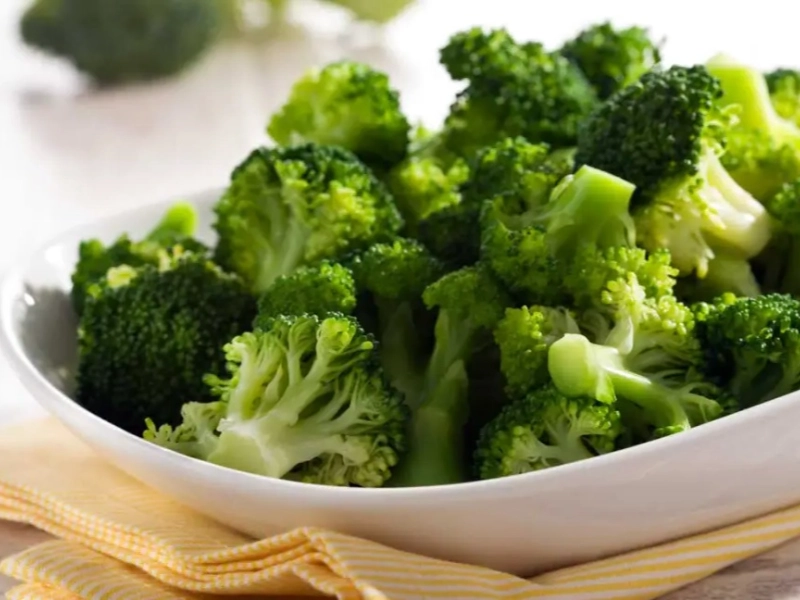Broccoli is a powerhouse of nutrients that can aid in the prevention and treatment of eye conditions. This cruciferous vegetable serves as a natural detoxifier, helping to eliminate environmental toxins from the eyes.It is particularly rich in lutein and zeaxanthin, which are crucial for reducing the risk of age-related macular degeneration. Additionally, broccoli contains vitamin C, which bolsters the immune system and may slow the progression of eye diseases.

 Broccoli is known for its anti-inflammatory and antioxidant properties, and it contains glucosinolates that may help protect against cancer and chronic diseases. This vegetable is also a source of vitamin A, which is essential for maintaining eye health. It helps keep the lens healthy and may prevent age-related macular degeneration and cataracts. Furthermore, the lutein and zeaxanthin in broccoli combat oxidative stress and inflammation in the eyes.
Broccoli is abundant in important vitamins and minerals, including vitamin C, potassium, folate, and vitamin K1. One cup of cooked broccoli provides about 80% of the recommended daily value for these nutrients.
Broccoli is known for its anti-inflammatory and antioxidant properties, and it contains glucosinolates that may help protect against cancer and chronic diseases. This vegetable is also a source of vitamin A, which is essential for maintaining eye health. It helps keep the lens healthy and may prevent age-related macular degeneration and cataracts. Furthermore, the lutein and zeaxanthin in broccoli combat oxidative stress and inflammation in the eyes.
Broccoli is abundant in important vitamins and minerals, including vitamin C, potassium, folate, and vitamin K1. One cup of cooked broccoli provides about 80% of the recommended daily value for these nutrients.

Among green vegetables, broccoli stands out for its content of lutein and zeaxanthin, which have been linked to a decreased risk of age-related cataracts and macular degeneration. It also contains beta-carotene, which the body converts to vitamin A, enhancing eyesight in those with low intake of this vital nutrient. Like other cruciferous vegetables, broccoli is high in antioxidants that protect cells from damage caused by free radicals—unstable molecules produced during normal metabolism or environmental stress. These free radicals can harm healthy tissues and contribute to diseases like cancer. Additionally, the isothiocyanates in broccoli possess antibacterial properties that may lower the risk of foodborne infections, particularly those caused by antibiotic-resistant bacteria. When selecting fresh broccoli, look for dark green leaves, firm stalks, and compact bud clusters, ensuring a crisp flavor rather than a fibrous or woody texture.
 The vitamin E found in broccoli acts as an antioxidant, neutralizing free radicals that can damage cells and lead to chronic inflammation. It also helps regulate the expression of genes involved in the inflammatory process.
Other vital nutrients in broccoli include calcium (providing about 9% of the daily value per cup), vitamin C, folate, riboflavin, potassium, and zinc. It is also a good source of iron.
Individuals who consume higher amounts of lutein and zeaxanthin have a lower risk of age-related macular degeneration and cataracts, as these carotenoids work together to protect eye health.
The vitamin E found in broccoli acts as an antioxidant, neutralizing free radicals that can damage cells and lead to chronic inflammation. It also helps regulate the expression of genes involved in the inflammatory process.
Other vital nutrients in broccoli include calcium (providing about 9% of the daily value per cup), vitamin C, folate, riboflavin, potassium, and zinc. It is also a good source of iron.
Individuals who consume higher amounts of lutein and zeaxanthin have a lower risk of age-related macular degeneration and cataracts, as these carotenoids work together to protect eye health.
 As a member of the cruciferous family, broccoli contains vitamin K, which promotes healthy blood flow to the eyes and brain. The antioxidants lutein and zeaxanthin further support eye health by reducing the risk of macular degeneration.
A recent study published in *Scientific Reports* highlighted that a compound called indole-3-carbonol (I3C) in broccoli enhances the body's ability to produce aryl hydrocarbon receptor proteins (AhR), which detoxify the retina. I3C can increase the effectiveness of AhR significantly, potentially helping to prevent age-related macular degeneration and other vision issues.
Vitamin C, an antioxidant abundant in foods like strawberries, bell peppers, and broccoli, protects the retina from oxidative damage and slows the progression of macular degeneration, glaucoma, and cataracts.
As a member of the cruciferous family, broccoli contains vitamin K, which promotes healthy blood flow to the eyes and brain. The antioxidants lutein and zeaxanthin further support eye health by reducing the risk of macular degeneration.
A recent study published in *Scientific Reports* highlighted that a compound called indole-3-carbonol (I3C) in broccoli enhances the body's ability to produce aryl hydrocarbon receptor proteins (AhR), which detoxify the retina. I3C can increase the effectiveness of AhR significantly, potentially helping to prevent age-related macular degeneration and other vision issues.
Vitamin C, an antioxidant abundant in foods like strawberries, bell peppers, and broccoli, protects the retina from oxidative damage and slows the progression of macular degeneration, glaucoma, and cataracts.